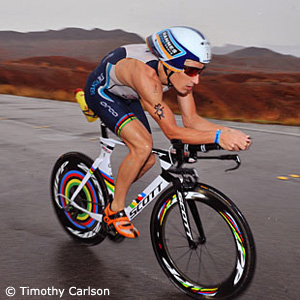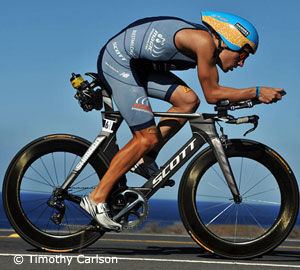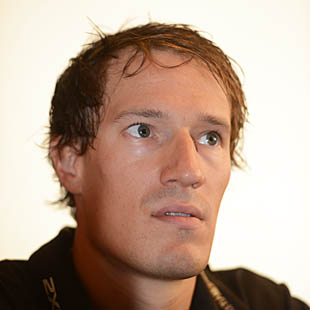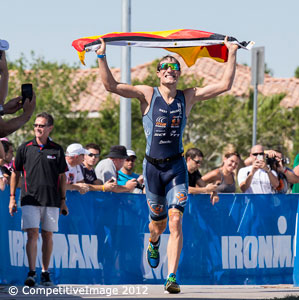The Comeback Kid repeats
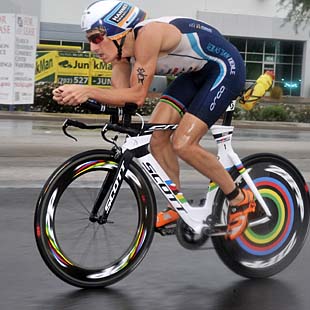
After his impressive win last year at Las Vegas and a 4th place despite a flat tire in his Kona debut, it seemed as if the triathlon world would be Sebastian Kienle’s oyster in 2013. But a twisted ankle and ligament rupture in February and a subsequent bacterial infection that left him lethargic and weak turned his world upside down. In spring, Kienle finished 18th at St. George 70.3 then took six weeks completely off and spent more time training solely on the bike – no swim, no run. By midsummer things were not much better as he finished a badly beaten 6th at Wiesbaden and 10th at Ironman Frankfurt. To the outside world, it looked like Samson’s locks had been cut and his power had gone with it.
So how did the latest in a long line of Germany’s great triathlon Überbikers pull off a repeat win at the Ironman 70.3 World Championship? Two weeks before the race, Kienle was just hoping not to embarrass himself but on Sunday he crushed the field on the bike and closed with an excellent run. Kienle explained the mystery after the final 70.3 Worlds in Henderson, Nevada.
Slowtwitch: After such a tough year with results that clearly displayed how injured and sick you were, how did you pull this off?
Sebastian Kienle: After last year, a lot of guys said ‘You know it’s probably not going to happen again in the same way.’ It was true — my races had been pretty one-dimensional. It’s because I used the bike as a weapon to catch up after the swim and most of the time I was riding alone and the riders ahead know I am going to attack. This time there was 40 guys [more likely 20] in a group. Everybody knew there will be an attack. Then people will try to hang on and take chances so they won’t lose so much time.
ST: So what did you decide to do about your weaknesses?
Sebastian: At the end of last year I knew I knew I had to improve my swim and I had to improve my running. At that time I was really, really confident about this year. If you asked me in January, I’d say my chances were really good to repeat at Las Vegas. But then in February I twisted my ankle and I had a ligament rupture. I could not run for six weeks and also the swim was hard because I could not kick. Things were very difficult. Then I got ill with some kind of bacterial infection. The infection started before St. George and it didn’t go away for a while. So I had to take antibiotics and take more time off.
ST: Did you think this unexpected rest would serve you well at the end of the year?
Sebastian: Everybody tells me ‘You don't know what it’s good for. At the end of the season are the most important races.’ But I was anxious. The swim and the run you cannot improve when you must take time off. At that time I had only 10-12 hours of training a week. And I felt absolute shit. I wasn't so ill that I had to rest in bed. But my body was off. I was lethargic. My body would not accept the training. Then you talk to a lot of athletes and you get nervous. You can’t do all the things they are all doing all day.

ST: Sixth place at Wiesbaden must have been a shock?
Sebastian: Frodeno, he runs 6 minutes faster than me. But yeah! After Frankfurt, it started to get better. Slowly. Very slowly.
ST: What was it like to have to be patient while coming back?
Sebastian When you are coming back from so far down, every day it gets a little better. If every day you are improving constantly, of course this makes you feel great. The last 2-3 weeks it went very fast– 2-3 percent better every day. And I thought, ‘If only I had 2 more weeks I’d have a chance to get top 10 or something!’
ST: So coming into Las Vegas you thought you had no chance? What did you think when you came out of the water so far back?
Sebastian: I think I was earlier than last year. I think I had to make up 4 and a half minutes on the guys ahead last year. But this time it was like 20-25 miles before I caught the lead pack.
ST: Did you feel good starting the run slightly ahead? Did you worry you pushed too hard on the bike?
Sebastian: It is no risk for me to push as hard as I can on the bike. This is something I really know. I can go this hard on the bike and finish with a good run.
ST: How fast can you run after a hard bike at the 70.3 distance?
Sebastian: I couldn’t run a 1:08. But I could run a solid 1:15-1:16 after the bike. [He ran 1:14:50] That is something I know I could do. And that run can be fast enough to win if the best runners have to go hard to stay in touch on the bike. The guys behind me fucked up their legs, too.
ST: It seems you are right. Terenzo Bozzone said, ‘The guys I was riding with really pushed the pace to get our group going to Mile 20. A few times along the ride I actually started to second guess my legs. That first 20 miles was hard.’ And Joe Gambles said, ‘It wasn't like we were sitting in waiting for the run. My legs were done of the bike.’ So – was this your best race, given the circumstances?
Sebastian: Honestly it is my most important win because if you stop believing in yourself, you lose your best weapon. If you stop believing in yourself, you can ask yourself how it feels when you have some trouble and you will not have the same strength of will.
ST: No problems on the run?
Sebastian: Of course I start the run and I feel I have problems all 21k. Every stride I make it feels like I am cramping and I will fall down. I look at the guys chasing me on one out-and-back stretch of road where I am running uphill. I see them looking so good running downhill. They look so fast because they are going downhill. So you always feel you are going so slowly. But you must just focus on yourself, and doing the best that you can.
ST: Well done!


